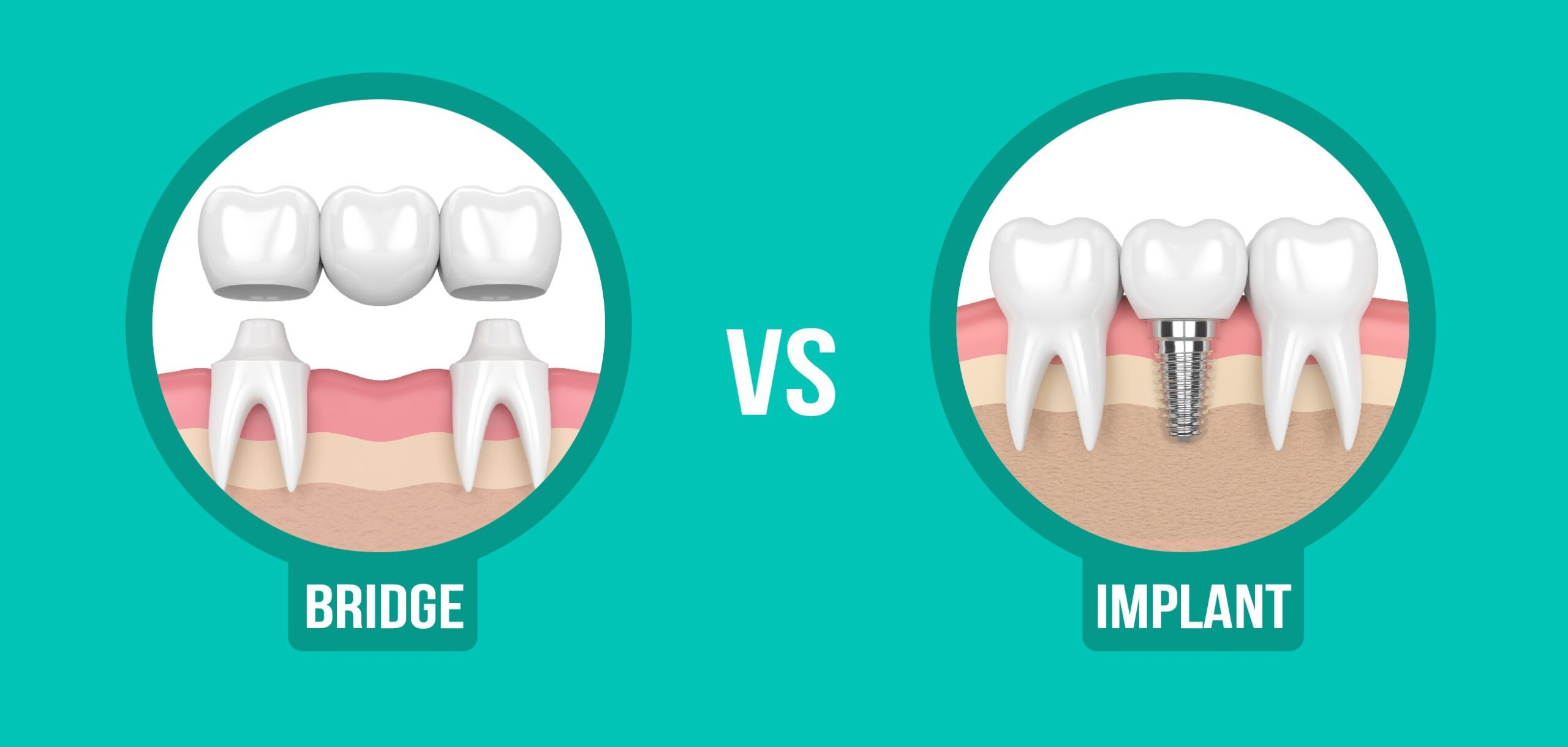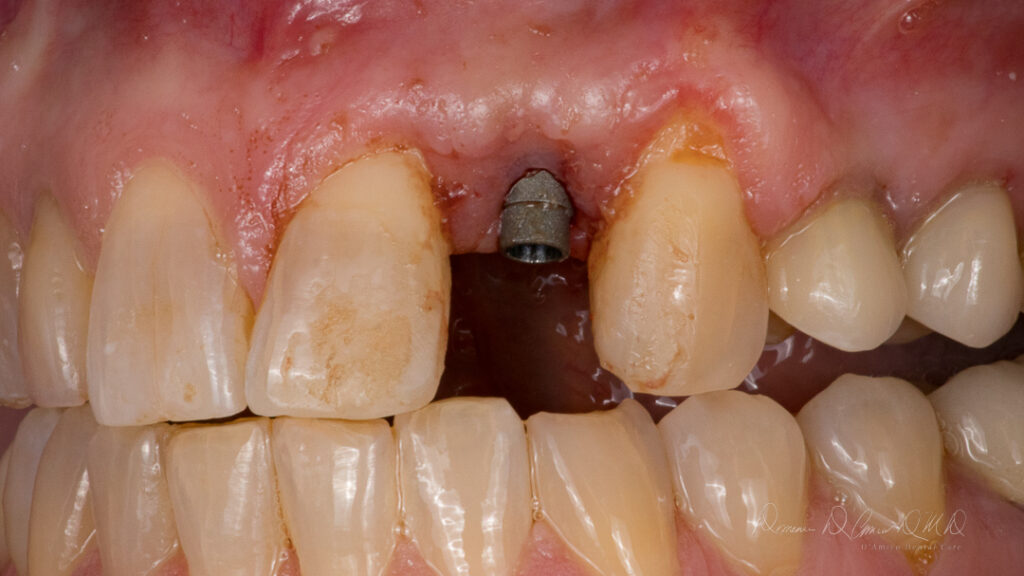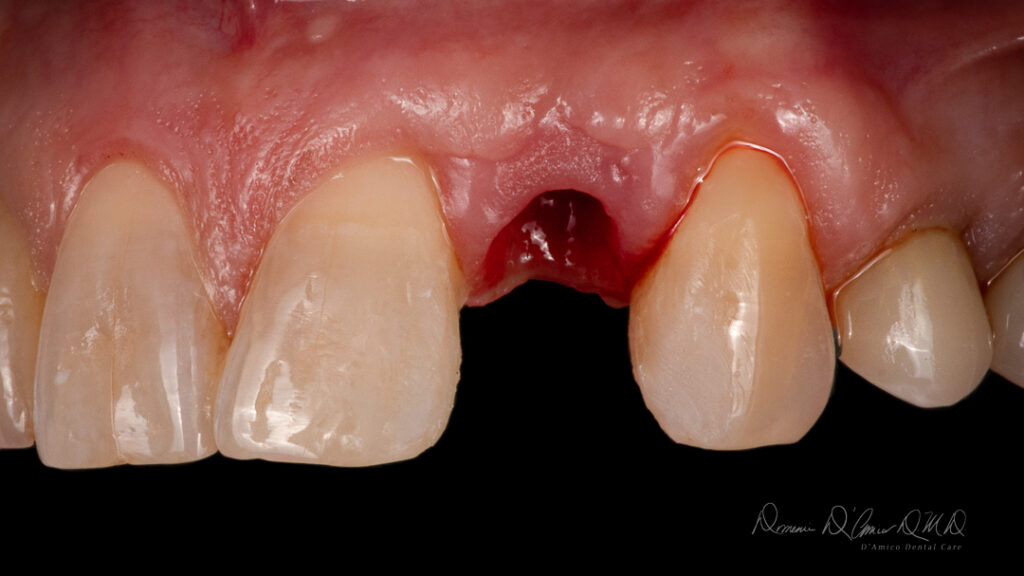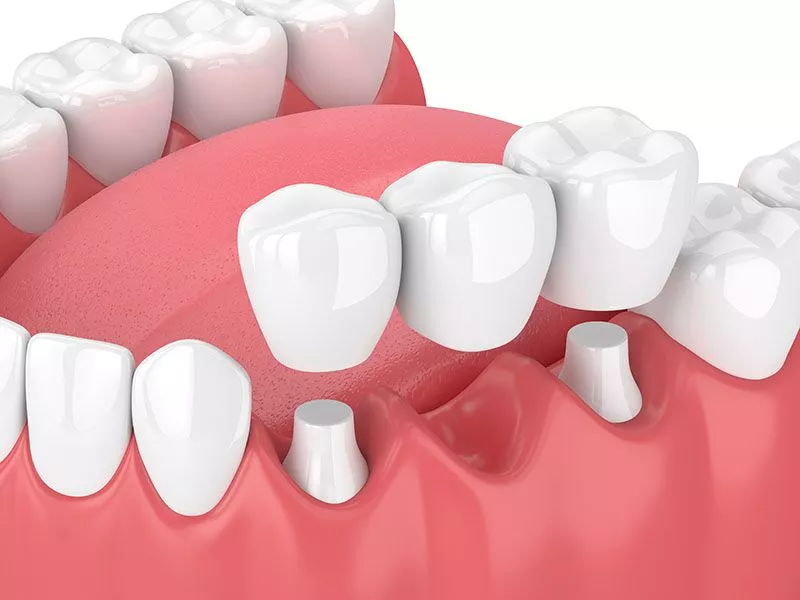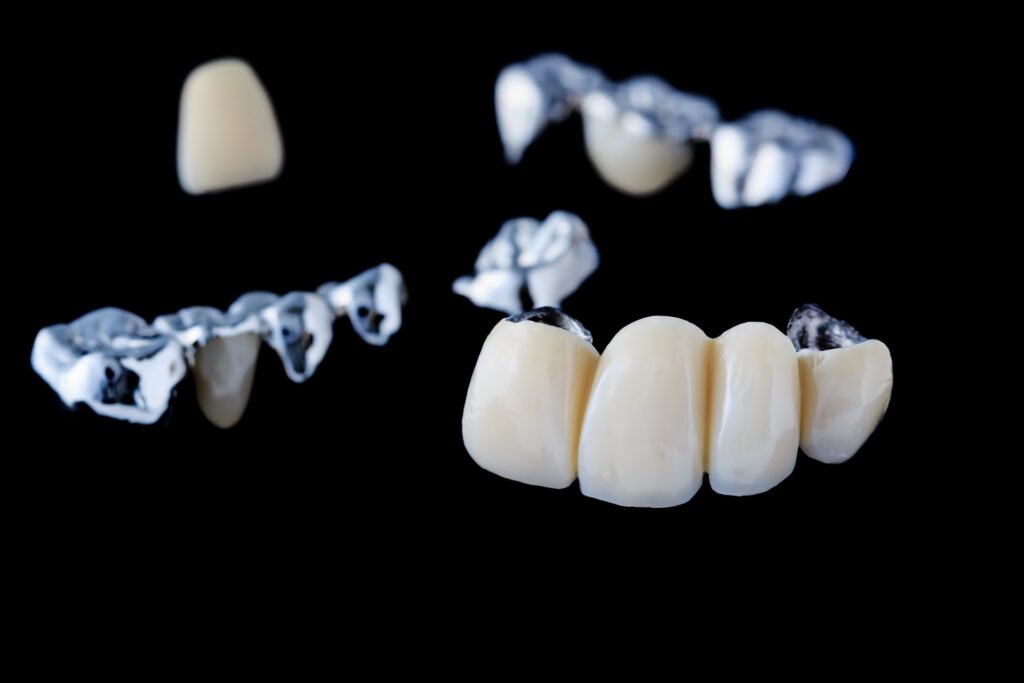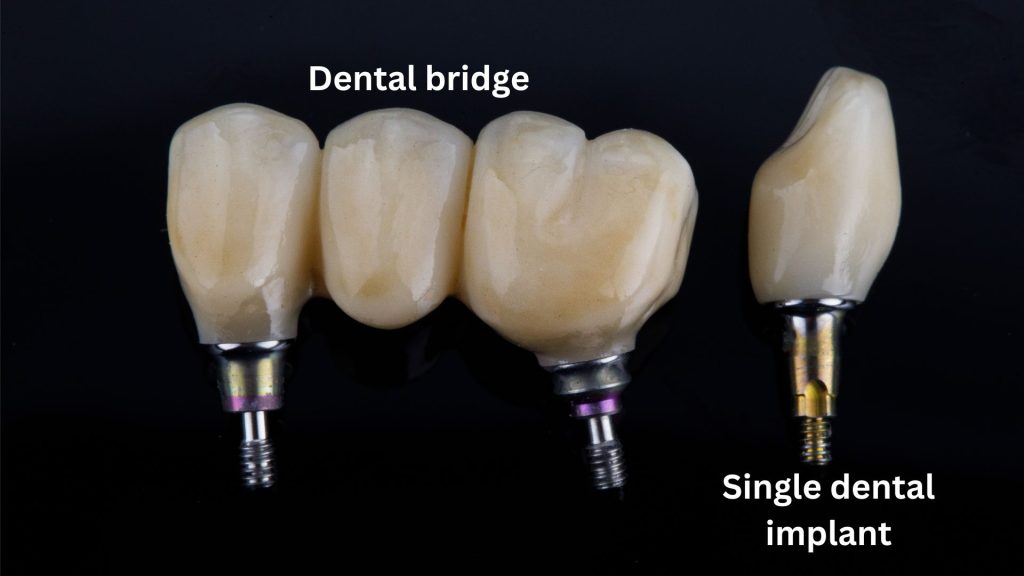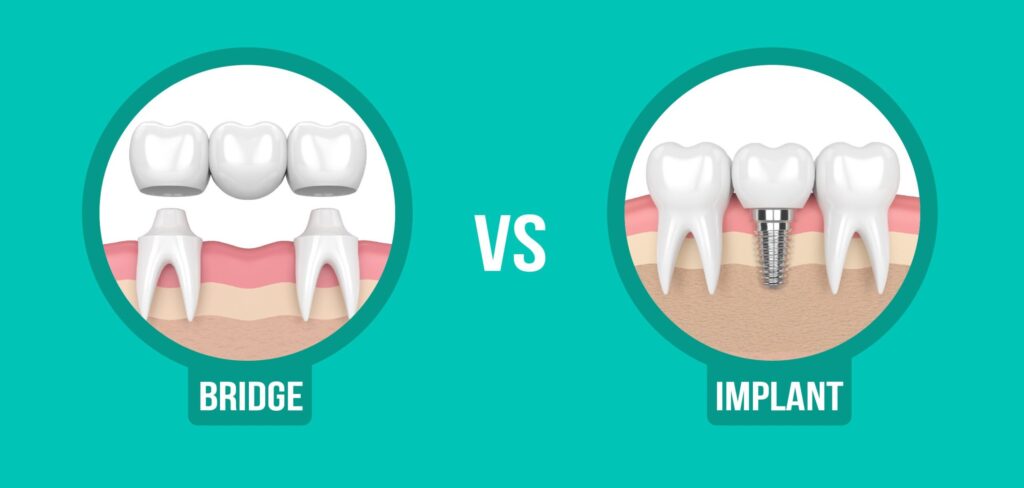
A dental implant consists of a titanium post that acts like a tooth root in your jawbone, topped with a crown. Its biggest advantages are preserving adjacent teeth and preventing bone loss. While implants last longer (15-25 years), they cost more and require several months of treatment. The dental implants vs bridges comparison shows bridges as a traditional alternative using adjacent teeth (which must be filed down) to support a fixed prosthesis. Bridges are more affordable and faster (2-3 visits), but weaken neighboring teeth and typically need replacement after 7-15 years.
If you have sufficient bone and budget, implants offer better longevity without compromising other teeth. Bridges may suit those avoiding surgery or with insufficient bone. Your dentist will recommend the best option after examining your teeth and discussing your budget. Both methods, when properly done, can effectively restore function and aesthetics to your smile.
In this dental bridge vs implant comparison, we’ll thoroughly examine both treatment methods by analyzing their respective advantages and limitations to help you make an informed decision for achieving your ideal smile restoration.
What Are Dental Implants?
A dental implant is a small titanium post that serves as an artificial tooth root, surgically placed in your jawbone. This system consists of three key components: the fixture (which fuses with your jawbone), the abutment (connector), and the crown (natural-looking visible part). After precise surgical placement, a 3-6 month healing period allows osseointegration (bone fusion) before attaching the permanent crown. When considering dental implants vs bridges, implants offer unique advantages as they don’t rely on neighboring teeth for support.
In the Dental Implant or Bridge decision, implants offer the most permanent and natural tooth replacement by functioning like real teeth while being fixed to preserve adjacent teeth and prevent bone loss, typically lasting 20-25+ years with proper care when placed by skilled surgeons using high-quality materials in patients with adequate bone and healthy gums.
Pros of Dental Implants
Dental implants offer several significant benefits over traditional methods. Their most important advantage is preserving jawbone structure, preventing bone loss. When considering dental implants vs bridges, implants stand out by leaving adjacent teeth untouched – no need for filing or altering healthy teeth. They function just like natural teeth, restoring full chewing ability while providing more aesthetic and stable results than removable dentures. With proper care, implants can last 20-25 years, significantly outlasting dental bridges.
The key difference between implants and bridges lies in implants providing unmatched comfort and natural function that eliminates denture issues like slipping and speech problems while restoring confident smiles, along with being easier to maintain than bridges and offering superior protection against adjacent tooth decay. They’re versatile enough to work in various bone conditions – even when grafting is required – and can replace anything from a single tooth to a full arch. At D’Amico Dental Care (serving Watertown and Wayland), we specialize in creating implant solutions that look, feel, and function just like natural teeth for decades to come.
Cons of Dental Implants
While dental implants offer many benefits, they do come with some disadvantages to consider. The most significant issue is their higher cost – typically 2-3 times more expensive than traditional options like bridges. The treatment process is also longer, potentially taking several months to a year, depending on the patient’s condition. When weighing dental implants vs bridges, it’s important to note that implants require surgery, which carries risks like infection, nerve damage, or bleeding. Additionally, some individuals (like uncontrolled diabetics or heavy smokers) may not be ideal candidates.
Many patients need bone grafts, increasing both cost and treatment time. Implants demand meticulous care, as poor hygiene can lead to peri-implantitis (infection around the implant). Rarely, patients may react to the implant materials. Unlike natural teeth, implants can’t adapt to jawbone changes over time and may require adjustments years later. These factors lead some patients to consider alternative treatments.
What Are Dental Bridges?
A dental bridge is a fixed restoration that replaces one or more missing teeth, consisting of three key components:
- Abutment teeth: The healthy adjacent teeth that are prepared to support the bridge
- Pontic: The artificial replacement tooth/teeth
- Crowns: The parts cemented onto the abutment teeth
Bridges offer a non-surgical alternative typically made from ceramic, porcelain-fused-to-metal, or zirconia in a dental lab. This custom restoration usually requires just 2-3 appointments without a lengthy recovery. The bridge is permanently bonded to prepared teeth with special cement, restoring natural-looking function.
Types of Dental Bridges
Dental bridges come in four main types, each with unique advantages and limitations. The traditional bridge – the most common style – uses two crowns on abutment teeth with pontics between them. Cantilever bridges work when there’s only one adjacent tooth, while Maryland (resin-bonded) bridges attach via metal/ceramic wings, requiring minimal tooth reduction. When comparing dental implants vs bridges, the implant-supported bridge stands out as the modern alternative, using implants rather than natural teeth as anchors.
The ideal bridge depends on factors like:
✓ Number of missing teeth
✓ Abutment tooth health
✓ Bone density
✓ Budget
Traditional bridges effectively replace 1-2 missing teeth while implant-supported bridges better address larger gaps, and Maryland bridges provide conservative preparation with reduced durability, making professional evaluation of your oral condition and personal needs essential for determining the optimal restoration.
Pros of Dental Bridges
Dental bridges offer several important benefits compared to other tooth replacement options. Their most significant advantage is lower cost than implants, making them more budget-friendly for many patients. When considering dental implants vs bridges, bridges require shorter treatment time (typically 2-3 weeks) with no surgery or lengthy recovery period. They can quickly restore both the appearance and function of missing teeth, especially ideal for patients who aren’t good implant candidates due to health conditions or significant bone loss.
In the dental bridge vs implant comparison, dental bridges offer versatile solutions for replacing one to multiple teeth with excellent aesthetics that match natural tooth color and shape, providing secure, non-removable functionality ideal for older patients or those avoiding surgery, while delivering 7-15 years of reliable service with proper care that restores normal chewing and speaking abilities.
Cons of Dental Bridges
While bridges offer benefits, they come with notable drawbacks. The biggest concern is requiring the alteration of healthy adjacent teeth, putting them at risk of decay and damage. Unlike implants, bridges don’t prevent bone loss and may gradually affect jaw structure over time. When comparing dental implants vs bridges, bridges typically last just 7-15 years – significantly shorter than implants. They’re also harder to clean underneath, requiring special hygiene care to prevent plaque buildup.
Among dental restoration options, bridges present limitations like potential wear/fracture requiring replacement, abutment tooth sensitivity, visible gum-line junctions over time (especially with metal-ceramic designs), and lack of adaptability where damaging one section often necessitates full replacement, making them unsuitable when adjacent teeth lack sufficient strength or health for proper support.
Dental Implants vs. Bridges: Key Differences
Implants and bridges serve as primary tooth replacement methods with fundamental structural and functional differences. The dental implants and bridges comparison reveals implants use titanium posts surgically placed in the jawbone to mimic tooth roots, while bridges rely on adjacent teeth, requiring their alteration. Implants typically last 15-25 years versus bridges’ 7-15 year lifespan, while also preventing bone loss – a key advantage bridges lack.
The fundamental difference between implants and bridges is that implants eliminate denture slippage and speech issues by functioning like natural teeth for confident smiles while being easier to maintain and gentler on adjacent teeth than bridges, offering versatile solutions from single-tooth to full-arch replacements even with bone loss through grafting techniques, which is why D’Amico Dental Care serving Watertown and Wayland specializes in delivering comfortable, natural-looking implant restorations built to last.
Durability and Longevity
Dental implants demonstrate superior longevity compared to bridges. High-quality implants with proper care can last 20-25 years or more, while bridges typically serve for 7-15 years. This difference stems from implants’ unique structure that fuses with the jawbone like natural roots, preventing bone loss. When evaluating dental implants vs bridges, implants also distribute chewing forces naturally without overloading adjacent teeth.
Bridge longevity depends mainly on abutment tooth health, while implant success relies on osseointegration (bone fusion). Bridges may need replacement due to abutment decay or cement failure, whereas implants typically fail from peri-implantitis (gum infection around the implant). While both benefit from good oral hygiene and regular check-ups, implants offer greater structural stability and durability overall.
Cost Comparison
Dental implants are significantly more expensive than bridges, typically costing 2-4 times more than a three-unit bridge. This price difference reflects the surgical procedure, high-quality materials, and specialized expertise required for implants. Additional expenses like bone grafts or sinus lifts may further increase implant costs. When considering dental implants vs bridges, bridges offer lower initial costs and often receive better insurance coverage.
While implants have higher upfront costs, they may prove more economical over time. Bridges usually require replacement every 7-15 years, incurring repeated expenses. Abutment teeth may also need additional treatments like root canals or crowns. Quality implants with proper care often last 20+ years without replacement. Therefore, while implants cost more initially, their lifetime expenses may ultimately be lower than bridges.
Function and Feel
Dental implants function remarkably like natural teeth. Their direct bone connection (osseointegration) allows natural transfer of chewing forces, creating a sensation identical to real teeth. After a brief adjustment period, patients typically perceive implants as part of their mouth, enjoying unrestricted food choices. Unlike bridges, implants effectively transmit pressure and temperature sensations. When evaluating dental implants vs bridges, implants provide superior sensory feedback and chewing efficiency.
In the dental bridge vs implant comparison, while bridges restore function, they differ from natural teeth by transferring chewing pressure to abutment teeth—sometimes causing discomfort with hard foods—and lack temperature sensitivity, making them initially feel unnatural despite well-designed bridges approaching natural function, though never fully matching implants’ biomechanical realism.
Procedure and Recovery
Getting dental implants is a surgical procedure typically done in stages. First, the titanium post is placed in your jawbone, requiring 3-6 months to fuse with bone (osseointegration). Then the abutment and crown are attached. This process needs local/general anesthesia, and recovery may involve swelling and discomfort. When comparing dental implants vs bridges, bridges offer a non-surgical alternative completed in 2-3 visits – your dentist prepares abutment teeth, takes impressions, and bonds the pre-made bridge, usually with minimal discomfort and no special recovery period.
In the Dental Implant or Bridge comparison, implants require 4-9 months for completion but offer permanent results with possible post-surgical discomfort, while bridges finish in 2-3 weeks but necessitate altering adjacent teeth, potentially causing sensitivity, with implants ultimately providing more natural sensory feedback and adaptive function despite bridges also effectively restoring basic chewing capabilities.
Maintenance and Oral Hygiene
Dental implants require special care to prevent peri-implantitis (gum inflammation around implants). Brushing twice daily with a soft toothbrush and using implant-specific floss (like Superfloss) is crucial. Regular dental check-ups every 6 months are vital to monitor bone and gum health around implants. Avoiding smoking and chewing hard objects also helps extend implant lifespan. When considering dental implants vs bridges, bridges demand meticulous cleaning under the pontic (artificial tooth) to prevent plaque and bacteria buildup.
“ Lack of interproximal cleaning and the presence of plaque/calculus were significantly associated with peri-implant disease in a community-based general practice setting, and patients reported mixed recall of OHI. “
When evaluating dental restoration options, bridges demand more complex cleaning with specialized tools like Superfloss and interdental brushes while posing higher decay risks for abutment teeth that necessitate vigilant monitoring, whereas implants require less maintenance but risk severe peri-implant infections if neglected, making annual professional cleanings mandatory for both though bridges generally need earlier replacement, with optimal oral hygiene being the critical factor for maximizing either restoration’s lifespan.
Suitability and Eligibility
Dental implants work best for patients with adequate bone density and good overall health, especially those wanting to preserve adjacent healthy teeth. However, uncontrolled diabetics, severe osteoporosis patients, and heavy smokers may not qualify. Those with jaw radiation history or autoimmune diseases also typically aren’t implant candidates. When examining dental implants vs bridges, bridges better suit patients with strong, healthy abutment teeth who prefer to avoid surgery.
Bridges aren’t ideal when abutment teeth are weak or decayed, or for excessively large gaps. Conversely, implants may not work for patients with severe bone loss unwilling/unable to get bone grafts. Age matters too – implants aren’t recommended under age 18 since jaw growth continues. Your dentist will recommend the best option after evaluating your oral health, medical history, and personal preferences.
Which One Is Right for You?
Choosing between tooth replacement options involves multiple factors requiring careful evaluation by both dentist and patient. Your oral and overall health are paramount – with sufficient jawbone and good health, implants offer a more permanent solution. When considering dental implants vs bridges, bridges may be preferable if adjacent teeth are strong and you wish to avoid surgery. Budget and treatment time also matter; while implants cost more initially, they may prove more economical long-term.
Understanding the difference between implants and bridges requires considering your lifestyle and preferences, as implants deliver superior natural feel and longevity while bridges suit those needing faster solutions or wishing to avoid surgery, which is why at D’Amico Dental Care serving Watertown and Wayland we analyze your oral health, habits, and aesthetic goals during comprehensive consultations to recommend your ideal tooth replacement option.
When to Choose Implants?
Dental implants are the top choice for patients seeking a permanent, natural-looking solution for missing teeth. This method particularly suits those with healthy adjacent teeth that they want to preserve from alteration. When comparing dental implants and bridges, implants deliver excellent results when jawbone loss isn’t too advanced or when patients are willing to undergo bone grafting. Individuals who prioritize aesthetics, natural function, and have a budget for long-term investment typically make ideal implant candidates.
Among dental restoration options, patients achieve optimal outcomes when in good general health without uncontrolled conditions like advanced diabetes, with non-smokers or those committed to quitting demonstrating higher success rates alongside individuals maintaining excellent oral hygiene, while implants particularly enhance quality of life for those with extensive tooth loss or denture dissatisfaction, though only a thorough dental evaluation can determine your ideal candidacy.
When Bridges Make More Sense
In the dental bridge vs implant decision, bridges often prove more practical for patients ineligible for implants due to severe jawbone loss (without bone grafting interest), financial constraints, or high-risk medical conditions, while also serving those needing immediate results without months of surgical healing, particularly older patients with robust adjacent teeth that can properly support the bridge structure.
When adjacent teeth already have crowns or require them, a bridge can address both issues simultaneously. For small gaps (one or two missing teeth), bridges offer more predictable results. They’re also a more comfortable choice for patients who fear surgery or can’t handle the long recovery of implants. In the dental implants vs bridges debate, time can be a deciding factor—for example, when preparing for an important event. A bridge can restore your smile in just two to three weeks. Your dentist will consider all these factors to help you make the best decision.
Source: healthline
FAQ
- What are the structural differences between dental implants and bridges?
Implant:
- Titanium post replaces the tooth root
- Does not require preparation of adjacent teeth
- Functions independently
Bridge:
- Requires preparation of teeth on both sides of the gap
- Uses adjacent teeth as supports
- Constructed as a single continuous unit
- Why do many people prefer implants?
- Preserves adjacent teeth (no need for reduction)
- Prevents bone loss (continues jawbone stimulation)
- Longer lifespan (can last a lifetime with proper care)
- More natural feel (similar to natural teeth)
- Easier maintenance (cleans like natural teeth)
- When is a bridge the better option?
- Lower cost (about 30-50% cheaper than implants)
- Shorter treatment time (typically 2-3 weeks)
- No surgery required (better for patients afraid of surgery)
- Suitable for special cases where implants aren’t feasible
- Better insurance coverage (usually covers more of the cost)
- Which one lasts longer?
Implant:
- Titanium post: Often lasts a lifetime
- Implant crown: 10-15 years (needs replacement)
Bridge:
- Average lifespan: 7-10 years
- May need earlier replacement due to decay of supporting teeth
- Possible need for root canal treatment on supporting teeth over time
- What is the treatment process for each?
Implant:
- Examination and planning (1 visit)
- Implant placement surgery (1 visit)
- 3-6 month healing period
- Abutment and crown placement (1-2 visits)
Bridge:
- Examination and preparation (1 visit)
- Preparation of supporting teeth (1 visit)
- Impression and bridge fabrication (1-2 weeks)
- Bridge cementation (1 visit)
- What is the cost difference between implants and bridges?
Implant:
- Insurance coverage: Usually limited or none
- Additional costs: CT scan, bone graft (if needed)
Bridge:
- Insurance coverage: Usually covers part of the cost
- Additional costs: Root canal treatment of supporting teeth (if needed)
- How to choose between implants and bridges?
Key decision factors:
- Health of adjacent teeth (implants are better if healthy)
- Jawbone quality (implants require adequate bone)
- Your budget (the bridge is more affordable)
- Required treatment speed (bridge is faster)
- Long-term expectations (implants last longer)
- How to care for each?
Implant:
- Regular brushing and flossing
- Routine checkups every 6 months
- Annual professional cleaning
- Avoid excessive pressure
Bridge:
- Use special floss for bridges
- Clean under the bridge with special tools
- Regular checkups to monitor supporting teeth
- Avoid chewing hard foods

